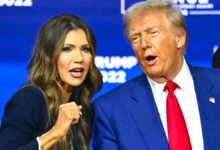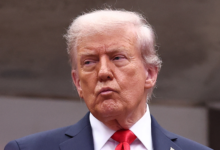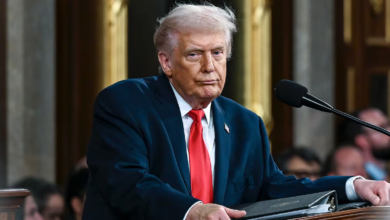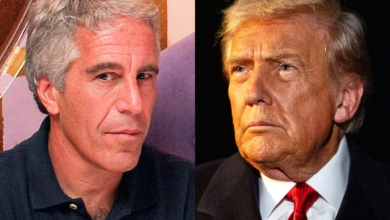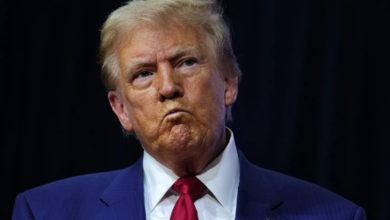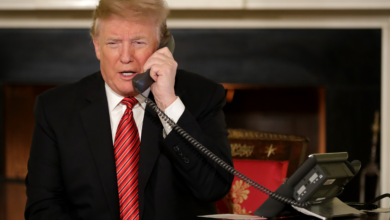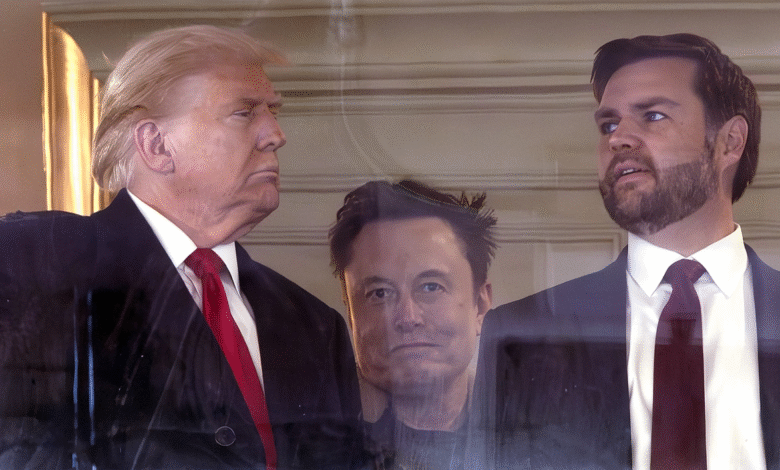
Elon Musk and Donald Trump were the dominant figures on the internet and in Washington day in and day out. Then the richest man in the world began to disappear.
On Truth Social, where Trump is known for sharing his candid thoughts, the president used to mention Musk every few days, but now he hasn’t posted about him in over a month. Trump’s fundraising campaign has largely stopped sending emails containing the Tesla CEO’s name. The billionaire’s name, once a staple of White House briefings, is now rarely mentioned. Even members of Congress have removed him from their newsletters.
It’s a marked change for a man who was nearly omnipresent in the early days of Trump’s second administration. Musk has been in the Oval Office, at Cabinet meetings, and aboard Air Force One. He attended the inauguration and then the House of Representatives for Trump’s first address to Congress, where Trump praised his hard work. Take a photo with the president and a row of Tesla cars on the White House lawn.

But Elon Musk’s significant presence in Washington has ended, according to a Politico analysis. During Trump’s rapidly evolving second presidency, Musk’s monopoly on political discourse, news coverage, and social media appears to have been broken, in part because Trump and Republicans have almost completely stopped talking about him.
“I miss him,” said Sen. John Kennedy (R-Louisiana).
Musk’s declining presence could have political benefits for the Republican Party. Opinion polls show his popularity is declining—far more than Trump’s. Early last month, Republicans also lost a key judicial race in Wisconsin, where Musk had become a major fundraiser and a key campaign issue. In Washington, Musk’s Department of Government Efficiency’s cost-cutting efforts continued but were politically undermined by tariffs and a budget battle.
Republicans always speak positively of Musk when asked about him. They naturally want his vast wealth, army of supporters, and online influence to help them in the next election. But while Kennedy argued that Musk’s withdrawal wouldn’t make much difference in the midterms, others began to suggest that the tech CEO’s best chance to help the party might not be in his own campaign until 2026.
“Public opinion polls show Elon does well when he’s inside,” said David McIntosh, CEO of the conservative Club for Growth. “We hope he stays long enough to do that, but he’s not playing the role of vice president during the campaign.”

This could complicate Democrats’ efforts to use Musk as a political tool. They have spent months refining strategies, particularly in the Wisconsin race, to link the unpopular billionaire to their Republican opponents in hotly contested elections across the country.
But the Tesla CEO, who has a huge following on his social media platform X, is unlikely to disappear completely—and Democrats say they can still use him as a formidable figure. Musk has become such a powerful villain on the left that Democrats still expect to invoke him ahead of this year’s competitive elections in Virginia and New Jersey, as well as in next year’s midterms. While Republicans tend to highlight this issue, they haven’t completely turned away from it.
“Ultimately, the issue here was never Elon Musk, but rather Elon Musk’s character,” said Jesse Ferguson, a Democratic strategist. “He’s created his own narrative, and it’s not about theoretical blame, but about the real damage he and Trump have done, which will be contested throughout the midterm elections.”
The Trump administration’s online distancing from Musk has been dramatic. In February and March, Trump tweeted about the Tesla CEO about four times a week; since early April, President Musk has not been mentioned once on Truth Social.
Trump has stopped posting about Elon Musk
How many Truth Social posts from Trump mentioned Elon Musk each week since the start of his term

Asked about Trump’s refusal to mention Musk and whether the tech CEO was a political liability, the White House did not directly mention Musk.
“DOGE’s mission—to reduce waste, fraud, and abuse—will certainly continue,” Trump press secretary Carolyn Leavitt said in a statement. “DOGE employees who have rejoined their agencies will continue to work with President Trump’s administration to make our government more efficient.”
Trump is not alone. The president’s top advisers, as well as official White House accounts, have largely stopped posting images and content mentioning Musk.
Trump no longer uses Musk’s name to raise money. By February, his fundraising campaign included mentions of Musk in emails to his online supporters almost daily, a sign that the Tesla CEO was making a significant living by raising money through his online support base. (One fundraising message, sent on February 27, read: “I love Elon Musk! The media wants to divide us, and it’s not working. He’s awesome!”)
But mentions of Musk in fundraising campaigns abruptly stopped in early March. Since then, Trump has sent only one fundraising message mentioning Musk: a May email promoting a “Gulf America” hat the Tesla CEO had tried on.
As Musk’s role in the White House has publicly diminished, his Google search traffic has declined, and he has been mentioned less frequently in the news. This is a far cry from the attention he received as a central political figure during the campaign and then as the leader of the Trump administration’s efforts to curtail the powers of the federal government.
Trump-linked accounts are posting about Musk less often, too
Number of daily posts mentioning @elonmusk on X from prominent accounts linked to the Trump administration

Some Republicans now view Musk as a malign political influence, something Democrats are trying to exploit. First, there are the polls: voters tend to view Musk much less favorably than Trump. Compared to recent months, the Tesla CEO’s approval rating has declined among most groups, including independents and voters without a college degree.
A survey conducted by Navigator Research earlier this spring showed that DOGE’s work becomes less popular when associated with Musk, and a Data for Progress poll conducted in late April found that most voters want Musk removed from government positions at the end of his 130-day term as a private employee, which is expected to end in late May, if not earlier.
“The public supported the effort to end wasteful spending in Washington, but they didn’t support the way it was done,” said Frank Luntz, a Republican pollster. His mission to reduce waste in Washington was certainly helpful, but the language he used was not.
Sen. Jim Justice (R-W.Va.), a key Trump ally, said Musk was a “patriot” who “strives to sacrifice his time and put in a lot of effort.” But he admitted that the head of the public affairs department had irritated some people.
“We’re very close to the danger zone. We’ve cut the lawn too much. We’re just adapting. That’s the process,” he said.
In Wisconsin, Democrats made Musk the frontrunner in the state Supreme Court race in April, encouraged by the Tesla CEO’s role as a major donor to the conservative candidate and his involvement in the state’s election campaign. The race has become a referendum not only on the Trump administration as a whole, but on Musk specifically. Judge Susan Crawford, a liberal candidate who ran an ad accusing Musk of trying to “buy” a seat on the court, won by 10 points in a state Trump narrowly won last November.
“He’s done,” said one Republican official, who requested anonymity to speak candidly. “His poll numbers are terrible. People hate him.” He added: “He would go into Wisconsin thinking he could buy people’s votes, wear a paper hat, and act like a nine-year-old… It doesn’t work. It’s offensive.” »

Besides potential political concerns, Musk’s retreat from the spotlight partly reflects the rapid shifts in priorities during the early months of the Trump presidency. In the early months, budget cuts at the U.S. Department of Energy were his top priority. While these efforts continue, they have also ceded some of the spotlight to other Trump initiatives, including his market-destroying tariffs and controversial deportations.
So, even though Elon Musk’s public profile has declined, that doesn’t mean he lacks access or influence. Last week, he was among the tech CEOs who joined Trump in Saudi Arabia, where he shook hands with the country’s leaders and spoke at an investment forum.
The Energy Department’s aggressive cost-cutting efforts, spearheaded by an employee Musk hired, are expected to continue even after he officially leaves his position as a special government employee. Both Republicans and Democrats expect the tech billionaire, who has invested $290 million of his own money in the 2024 election, to remain a major political player.
That’s one reason Democrats aren’t worried. Musk remains a Democratic challenger, but in the context of Trump and the Republicans who supported him, said CJ Warnke, a spokesman for the House Majority Political Action Committee, the Democratic super PAC in the congressional elections. He added that the issues that replaced Musk as the dominant topic, such as potential cuts to Medicaid and tariffs, are still relevant to Democrats.
During the Wisconsin Supreme Court race, many ads supporting Crawford focused primarily or entirely on Musk, and for a time, Democrats occasionally mentioned Musk—but not Trump—on social media and in statements.
The Tesla CEO’s name continues to appear regularly in ads for Democratic congressional candidates, from Pennsylvania to Illinois and California, in safe and swing districts alike. Of the six Democrats running in the New Jersey gubernatorial primary on June 10, four have mentioned Musk in television ads.
But recent ads tend to avoid portraying Musk as the main villain. While ads cover New Jersey in the final weeks of the race, the ads that mention Musk generally place him alongside Trump. Sometimes, a hint or a quick glance at the screen mentions him—not the main character.


